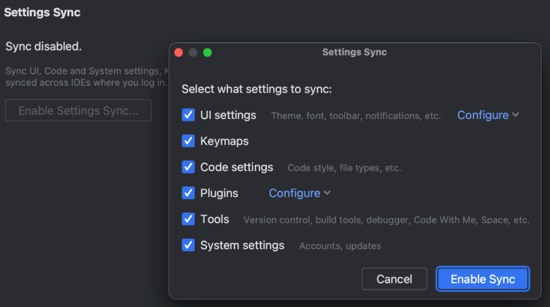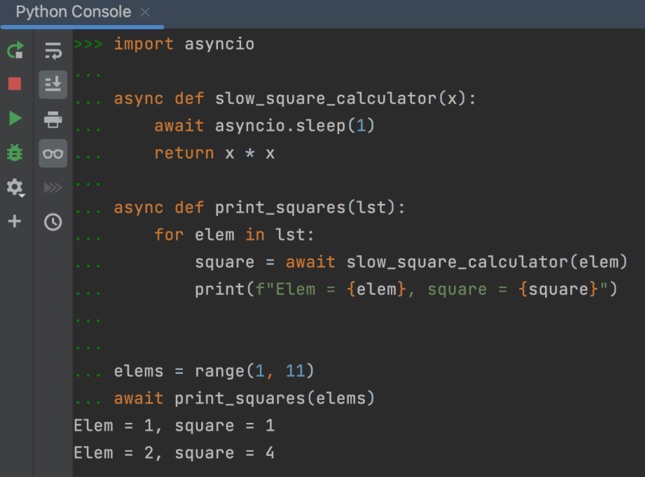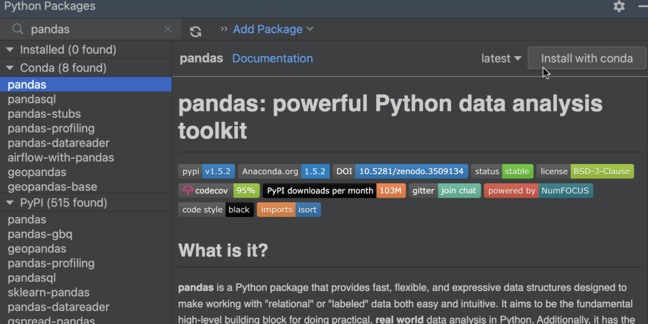| Catching Up With PyCharm 2022.3 |
| Written by Mike James | |||
| Tuesday, 31 January 2023 | |||
|
PyCharm 2022.3.2, the second minor bugfix release for the latest edition of PyCharm, has just been released. But if you hadn't noticed the new features in PyCharm 2022.3 here's a catchup. PyCharm is the cross-platform IDE from JetBrains that provides code analysis, a graphical debugger, an integrated unit tester, integration with version control systems, and supports web development with Django. It has two versions, a Professional Edition and a less extensive Community Edition released under the Apache licence. JetBrains' 2020 survey of Python Developers found PyCharm to be the most popular Python IDE, with a share of 33% for its Community and Professional Editions combined. That year relative newcomer VS Code, with a share of 29%, came second. In the 2022 edition of the same survey VS Code had clearly overtaken PyCharm in terms of usage, which is unsurprising as it is multi-lingual and so are the majority of Python programmers. However PyCharm remained the second choice of IDE for those learning to code, used by 26% The top highlight in Valeria Letusheva's blog post announcing the availability of PyCharm 2022.3.2 is: The behavior of the Settings Sync plugin has been updated. Settings synchronization across different IDE products is now turned off by default and can be enabled via a checkbox in Settings/Preferences | Settings Sync. As a sporadic user of PyCharm this prompted the question "what Setting Sync Plugin" which led me to look at What’s New in PyCharm 2022.3, from the release of PyCharm 2022.3.0 at the end of last year. Top billing is given to this very feature which is described as: capable of syncing most of the shareable settings from the platform, bundled plugins, and some third-party plugins. I have to admit that this is not a feature that I would use, so having it relegated to being optional and in the background suits me. The top feature for me is enhanced asyncio support in the built-in Python Console: PyCharm 2022.3 also adds asyncio support for the debugger but as this is an experimental feature which might not be fully stable you need first to enable it. I prefer to wait a bit longer for the JetBrains team to iron out the issues - but async debugging is difficult and anything that helps is welcome. More immediately useful to many users is that the Python Packages tool window now works with the Anaconda package library, allowing you to customize your Conda interpreter directly while you are writing code. This means you can search, install, and delete Conda packages, including pandas, without leaving the Editor window: pandas users will appreciate enhanced UX for DataFrames which lets you switch between Table, Tree, and Text viewing modes. With this Pro feature it’s now possible to transpose DataFrames, hide columns, and use pagination to quickly navigate through the rows. In addition DataFrames can now be exported in a wide variety of formats, including Excel, JSON, HTML, XML, Markdown tables, and SQL Insert statements. Another Pro improvement is for Jupyter Notebooks where DataVision enables you to inspect Jupyter variables within your notebook. Enabling this optional feature gives useful inline information about a number of important variable types, such as the size and contents of NumPy arrays and pandas DataFrames. For Frontend web development PyCharm Pro adds support for Vitest, a Vite-native unit test framework. This complements Vite being added to the long list of frameworks for which project templates are on offer from the New Project wizard. Next.js is now also on the list and the project template for Vue has been updated. All these enhancements make PyCharm even more attractive for both the professional developer and for those learning to code and occasional users, who of course can use PyCharm Community edition for free.
More InformationRelated ArticlesWhat Makes Python Great & Greater (2021) PyCharm Now Supports Pipenv (2018) PyCharm 4 Released (2014) Free Version of PyCharm Python IDE (2013) To be informed about new articles on I Programmer, sign up for our weekly newsletter, subscribe to the RSS feed and follow us on Twitter, Facebook or Linkedin.
Comments
or email your comment to: comments@i-programmer.info |
|||
| Last Updated ( Thursday, 04 May 2023 ) |






